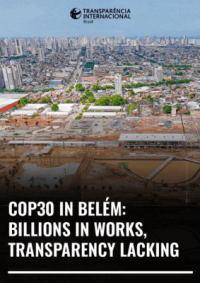In November 2025, the city of Belém, Pará, will host COP30, the world’s largest climate conference. Yet, long before the event begins, billions of reais in public works are already underway to prepare the city’s infrastructure.
The technical note “COP30 in Belém: Billions in Works, Transparency Lacking”, produced by Transparency International Brazil, reveals significant transparency gaps in how these works are being executed and disclosed. The analysis reviewed official portals and transparency pages of the federal government, the state of Pará, the municipality of Belém, the BNDES, and Itaipu, which together are responsible for about R$ 2.8 billion in investments.
Key findings include:
- None of the government entities publish complete information on environmental licenses granted for the works — such as the licensed activities, mitigation and compensation measures, license numbers, issuance and expiration dates, and current status.
- BNDES and Itaipu, which finance 21 of the 23 analyzed projects, do not disclose the full content of their agreements with the state and municipal governments, preventing proper monitoring of financial transfers and spending.
- No information on public consultations or hearings was found, indicating weak mechanisms for social participation and oversight.
- None of the entities make open data files available, limiting access to detailed information and hindering automated analysis of public spending.
The study also highlights some positive practices, such as the creation of dedicated transparency pages on COP30 by all three levels of government, and the publication of full contracts and bidding documents by the municipality of Belém, which achieved the best performance in the assessment.
The report warns that the lack of transparency in infrastructure projects — a sector historically prone to corruption — is particularly alarming given the context of COP30, whose credibility depends on the integrity and accountability of public investments made in the name of climate action.
Transparency International Brazil calls on the federal, state, and municipal governments to:
- Publish, in open formats, all contracts, agreements, and amendments related to COP30 works;
- Disclose the full environmental licenses and corresponding technical studies;
- Provide real-time data on physical and financial execution;
- Release reports of public hearings and consultations;
- And create integrated transparency portals for large-scale events, consolidating all information across government levels.
Through this analysis, Transparency International Brazil underscores that COP30 must not only be a milestone in global climate negotiations but also a model of transparency, integrity, and public participation — essential values for building a sustainable future for the Amazon and the planet.
